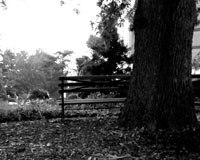
Topology of Violence
WTF Was That All About
Medievalisms
Jack
No longer living but to return in weeks after to that childhood house
You seemed to be there, a squeaky mouse,
Crept from beneath floor boards that, if it knew better,
Would beneath the baseboards vanish, having slept there
For it was in a dream through which such faint presence
Makes impossible all talk that would put out the nuisance.
She had been one I tried to enlist
In schemes that held my interest.
Perhaps I feared seeing her after many years again.
Her YouTube lecture I queued up in
Which she’d been hired to discuss Democracy
& Poetry,
Topic so weighty someone stronger
Might but I could listen no longer
Than the first Auden citation –
Look, I agree, it makes nothing happen,
But the expectations of the topic’s lecture
Were by standard higher than any occasion require.
I was tired. The pollen on a park’s picnic table awaits small things.
On railroad tracks I laid down once between
The rails. I have played golf.
Your achievements are only another North.
I have a wicked desire to not waste a professional's time.
It's that day of the year when the season's all up in mine.
My daughter complained of having hurt her shoulder doing a push-up.
The muscular young paramedic's eyes sweep
her mother and me into his glance, he tells her
"Now I have to ask you this: Have you begun yet to have your
Menstrual cycle?" To another question, she told him her shoulder pain slides
To a "9 on a 10-scale, or maybe 8.5."
I dislocated mine playing flag football. I have been fired twice.
Who am I to advise
My daughter? I want to tell her I watched you die. Your mother
Also, thirty-five years earlier, the foot of the stair
Her brother and I were at the head of when it was you.
There are too
Many small things: Samara seeds, and, of course, the oak catkins
That gather like the dryer filter's lint
Falling, it seems, in a single day to gather and mat
Against the curbs, around gutters, at the foot
Of stoops fronting, backing, and siding houses. A car's pulled onto the shoulder.
What catastrophe awaits dispersement as the gravel spins away, and should
I say that, when so striving,
I look inside, it's always a man driving –
Sitting, reading, late afternoon of a Friday,
waiting, Emily having pulled into the drive.
My teenage son, coffee table between us, also reads.
The table, strewn in books and magazines, allows the house
to seem, on a premise of its liminality,
quiet.
She doesn’t come in.
She’s on her phone, finishing up with a friend,
some outlandish workplace story
involving an unethical public school librarian
that will have us shaking our heads – later, when
she comes in.
For now, the waiting
is – I can’t quite slip it.
Almost, if I could remind her,
but I won’t, of the mess of what –
occurring when I
was younger, the feeling-tone of a fable –
it works like a joke, and involves a snail knocking
on a door as a man sits by himself in his house
late one evening, before bed, and rises to answer
so the snail can ask, “I’d like to talk to you about buying
some magazine subscriptions.”
Furious to have been so
bothered, the man boots the snail off the stoop
and slams his front door.
That’s the tone.
The householder.
What’s he doing in there?
I thought when I was in the house, the mechanical garage-door going
up, I may have been reading, I may have been
watching t.v., my mother away to visit a sick relative,
my sister away at school, by now I’m sure
I would have found something to eat in the refrigerator.
The engine cut, the door’s chain-lift let the door down.
Twenty minutes, then thirty, an hour, two.
And the oddly
persistent urge to go see if he was okay, yet
the dread of then dealing with him, no persistence
at all.
After a rain, some front yard animal’s
eminent domain included a mushroom’s dome.
Now it’s a chalice. Lest I choke its stem,
Cheers,
Still, I too easily regard him,
as Ginsberg claims Edward Carpenter,
my living link to Robert Duncan –
when, until later, his poems found me.
The forgiven porn of the shirtless man’s back.
That’s a lovely passage and you
say it beautifully – Chapter 15
of Twain’s novel.
This was in the teacher’s lounge at Iowa
I was talking to Shelley Nameroff,
his friend, after class,
truant upon their meeting he asked me to recite the passage –
the sort of extra-compositional feat
upon which singing school contests depend.
He had heard in Duncan’s “Meadow”
the accelerated cadence in “Perspective He Would Mutter,”
a poem, the dedication of which he removed,
then put back.
Beautiful fifty-something,
his age we dare not speak of
nor the twenty-year-wait between books,
also beautiful.
What then to say of poetry
beyond the being moved?
It’s a lovely passage.
His own he’d read when after pulled from a jacket pocket,
notes on all the folds.
No poet means precisely anything.
We walked from that teacher’s lounge as from a fog,
a popcorn rain. Going to bed.
“Dog my cats,”
he went on asking me to repeat the phrase.
Jeff Hamilton has published poems in Fence, Sou'wester, River Styx, Notre-Dame Review among many others. He also does scholarship on Robert Duncan and Laura Riding and writes music essays. He teaches and lives in Kirkwood, MO.

